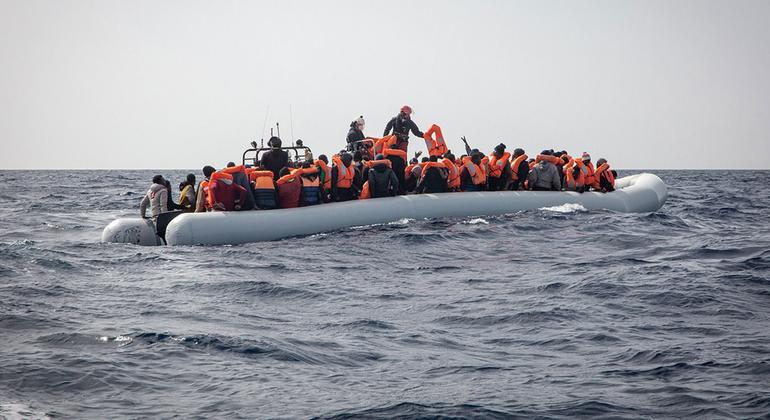UN Türk warns of widespread arbitrary detentions and impunity in Libya


The High Commissioner for Human Rights told member states that “trafficking in persons, torture, forced labour, extortion, starvation in intolerable conditions of detention” “are occurring on a large scale… with impunity”.
“Mass deportations, the sale of people, including children” are rampant in Libya, Mr. Türk continued, stressing that collusion between State and non-State actors is still going on, with victims are subjected to “dehumanization”.
In calling on Libyan authorities to investigate crimes against thousands of vulnerable people on the move, the High Commissioner also highlighted the discovery in March of a mass grave in southwestern Libya containing the bodies of 65 people believed to be migrants.
“As if this were not horrific enough, we are following reports of another mass grave recently discovered in the desert area on the Libyan-Tunisian border… The loved ones of those who died have every right to know the truth,” he said.
State of unrest
The High Commissioner also urged a review of a long-standing agreement between the European Union and the Libyan authorities to stop migrants trying to cross the Mediterranean to Europe. Independent rights experts and charities involved in search and rescue operations has frequently criticized the arrangementcited alleged reckless conduct by the Libyan Coast Guard, including firing at or near migrant boats and ramming them, causing them to capsize, before returning survivors to Libya.
Mr. Türk noted that in the 12 months since April 2023, more than 2,400 people have died or gone missing while attempting to cross the Mediterranean Sea, of whom more than 1,300 departed from Libya.
“It is absurd that people seeking safety and dignity should suffer and die in such unspeakable circumstances,” he stressed.I remind all States of their common responsibility under international law to save lives and prevent deaths at sea.“
The Dangers of the Sahara Desert
The High Commissioner also called for action to address the deaths of “many migrants and refugees” en route to Libya through the Sahara desert, following new estimates from the UN that Twice as many migrants may die trying to cross the sandbar than in the Mediterranean Sea.
While those grim findings reflect the growing number of people attempting to cross the Sahara, fueled by new conflicts in the Sahel and Sudan, climate shocks and protracted emergencies in the East and Horn of Africa, the dangers to migrants and refugees in Libya come amid ongoing political instability and conflict that has torn the country apart since the overthrow of longtime President Muammar Gaddafi in 2011.
The “volatile security situation” also prevents UN human rights monitors from fully accessing parts of the country’s south and east, Mr Türk added, adding that investigators were also denied access to detention facilities and other locations across the country.
extrajudicial killing
Noting a spike in “arbitrary arrests and detentions, enforced disappearances and related violations of detention” inside Libya, the UN rights chief also expressed concern about the continued targeting of political opponents and dissident voices. “While the numbers are likely to be higher and arrests are ongoing, we have verified at least 60 cases of arbitrary detention of individuals peacefully exercising their right to express their political views. In some cases, detention was followed by extrajudicial killings.”, he said, stressing that the continued lack of accountability for “violations and abuses” committed in 2011 “remains one of the most serious obstacles to reconciliation today and a driving force of conflict”.
Less than a year since Hurricane Daniel caused catastrophic flooding in the coastal city of Derna, killing thousands, Mr Türk still insists that the country remains “devastated by deep unrest”, while ordinary Libyans suffer “economic hardship coupled with political exclusion”.
The UN human rights chief stressed that the situation can be remedied, calling for a “rights-based, people-centred” process of reconciliation and transitional justice, a sustainable political solution, restoration of the rule of law – including accountability for human rights violations – and legitimate, unified institutions.


